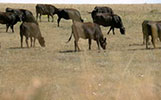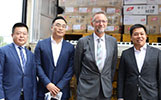| Cattle producers throughout Europe and North America have had a challenging summer in terms of weather; this comes at the same time as a number of other pressures for Irish farmers:
IFA Urges Ag Minister to Take Urgent Action on Income Crisis in Livestock Sector
The Beef Site | September 10, 2018
IFA National Livestock Chairman Angus Woods said livestock farmers are under immense income pressure from falling cattle prices, increased costs, severe weather conditions all year and the erosion of direct payments.
He said the income crisis in the livestock sector must be urgently addressed by Agriculture Minister Michael Creed and he cannot allow Budget 2019 pass without delivering on the IFA proposal for the introduction of a €200 targeted payment for suckler cows.
Industry Welcomes New Australia–Indonesia Trade Agreement
Beef Central | September 1, 2018
Tariffs on major Australian agricultural exports to Indonesia will fall following the conclusion of Indonesia–Australia Comprehensive Economic Partnership Agreement (IA–CEPA) negotiations on Friday.
Colorado Beef Industry Struggling Amid Drought, Wildfires and Tariffs 
Meghan Lopez, The Denver Channel | September 1, 2018
Cattle ranchers in Colorado are struggling to make ends meet after a particularly dry year in the state.
"This is one of the worst droughts that we've seen in my lifetime," said Retta Bruegger, a regional specialist in range management for Colorado State University.
At least 65 percent of the state is experiencing an extreme drought. Because of that, some ranchers are being forced to make tough decisions, including selling their cows sooner than they normally would and at lower weights. That means the ranchers are making less money per cow than they normally would.
Sustainable Beef Will Become the New Standard for Producers Worldwide 
Carmen White, Alberta Farmer Express | September 7, 2018
Carmen White, 15, of Claresholm was the junior winner in the Alberta Young Speakers for Agriculture competition at the Calgary Stampede. Her topic was: What is sustainability and why does it matter to Canadian agriculture?
Canadian agriculture is constantly evolving to meet the needs of society. Beef producers, like myself and my family, have a lot to consider when planning for the future. We have a mostly urban customer base, a more health–conscious consumer, and a closely examined beef industry.
As the world's population continues to grow, sustainability is more than just a buzzword. Many would consider it a requirement.
First 25t Container of Irish Beef Reaches China 
Conor Finnerty, Agriland | September 12, 2018
The first 25t container of Irish beef has recently reached Chinese shores, Bord Bia has confirmed. The product, from ABP, was purchased by Beijing Hopewise – a prominent Chinese import company specialising in online and foodservice sales, the Irish food board added.
Furthermore, Bord Bia's Shanghai office is currently rolling out a marketing and promotional campaign to support the sale of Irish beef online and introduce Irish beef to wholesalers, chefs and foodservice customers
Study Shows Success Of Sustainable Intensification
Cambridge Network | September 13, 2018
Nearly one–third of the world's farms have adopted more environmentally friendly practices while continuing to be productive, according to a global assessment by 17 scientists in five countries.
The researchers, including Dr Zareen Bharucha from Anglia Ruskin University's Global Sustainability Institute, analysed farms that use some form of 'sustainable intensification', a term for various practices, including organic farming, that increase crop yields while simultaneously improving ecosystems on and off farm, and build strong agricultural communities. Writing in the journal Nature Sustainability, the researchers estimate that nearly 163 million farms worldwide, covering over a billion acres, now practice some form of sustainable intensification, often with dramatic results. | |
